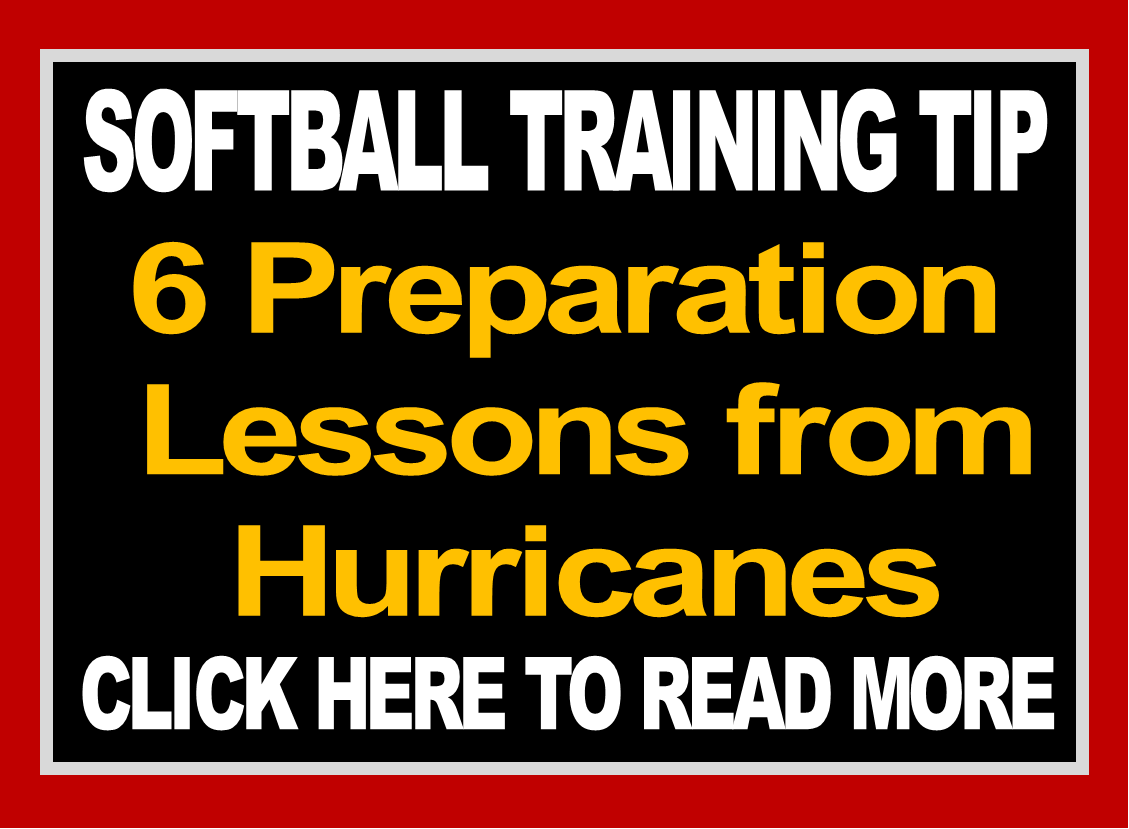
10 Oct 6 Preparation Lessons from Hurricanes

The impact of Hurricanes Fiona and Ian seem too big to comprehend and yet within these horrible storms lie some incredible lessons in preparation that can help us all.
Whether preparing for a hurricane or for gameday, being ready is key. Once the storm hits or the ump says, “play ball”, it’s too late. Use these 6 steps to make sure you’re ready.
I lived in Tampa a few years ago when Hurricane Irma was headed that way. At that time we evacuated to Jacksonville once Tampa became the target, and we had only a matter of hours to grab everything we thought we’d need or want – for maybe years. Recently, Hurricane Fiona caused major damage and destruction to Puerto Rico, and Florida and much of the eastern seaboard was met with the same fury under Hurricane Ian.
That process, and the days leading up to Hurricane Irma taught me some valuable lessons on being prepared that definitely apply to softball, and that I want to share with you now:
- Do What You Can, When You Can – When preparing for a crisis, waiting till the last minute isn’t really the way to go. Sure, you can get some stuff together if you need to, but will it be the stuff you needed, or wanted, or should have gotten? The more time you give yourself to game or storm plan, the better your plan will be. Planning early not only ensures you have more time to think of everything you need to do, but trust me, you’re much calmer 5 days before the storm hits than you are the morning you decide to evacuate. Calm plans are better plans.
- Get Up-To-Date Information – You want to get enough information to help you make a good, quality decision. Making sure your information is up-to-date means the difference between staying in Tampa because the storm is projected to hit Florida’s east coast and deciding to evacuate because it’s now barreling down on Tampa. Good preparation means you need to filter the nuggets of information that impact your actions from the excess or peripheral information that will impact your emotions. Once you know the hurricane is headed straight for you, you’ve got enough information to act. After that, the information will only serve to frighten you into in-action. For softball game planning, it’s very important to know that while your opponent has tremendous power against riseballs they will struggle greatly against your dropball pitcher. But continuing to learn that your opponent has never lost to a team from your conference in the history of their program is information that will only impact your emotions, not your actions.
- Work Backwards – Great planning starts with planning for the most essential things first, and leaving the fluff for last – if ever. Sure, I wanted to take family photos and heirlooms when I evacuated, but in reality, I needed flashlights, water, and all my important papers. If you’re preparing to face the best pitcher in the history of softball you’ll want to practice bunting long before you work on hitting with runners in scoring position.
- Work Together – Like softball, storm preparation is a team sport. It takes neighbors and friends to help each other, check on everyone and work together to be ready and be safe. The same goes for a solid game plan. The pitching coach has to work with the hitting coach and both have to work with the defensive coach to make sure the plan is cohesive and doable. Any solid plan involves teamwork in both the creation as well as the execution. Work together with your coaches and your players to create and execute, not only to ensure you’ve thought of everything, but so you’ll have help in getting it done.
Neighbors helping neighbors, friends helping friends and teammates helping teammates is how you successful get through any crisis.
- Communicate – We all handle stress differently and fleeing a life-threating hurricane is an extremely stressful situation. Talking with people is crucial not only for helping you get through the stress of the situation but for serving to calm others who can’t do anything but worry. I have a huge family and we’re talkers. So, while I didn’t have time to call each of them with a constant update, I did make sure I created a group text and sent updates as I learned them. It didn’t change the fact that Irma could likely destroy our house, but it sure helped my family know we were safe.
The parents of your ballplayers are the outsiders. They can’t do anything about the outcome except worry, so the more you can communicate with them the less they’ll have to make up and hopefully, the calmer they’ll be. Try to overcommunicate. People can choose to ignore information if they don’t need it much easier than they can handle not knowing something they deem crucial. While you might know what’s going on, others may not, so help keep people calm by communicating.
- Trust – And finally, once you’ve made your plan it’s time to trust your preparation, trust you’ve done what you can do, and then simply put your faith or trust or belief in the outcome. Once the game or the storm is here, the time for planning is over, and it’s time to trust your plan.
Softball Excellence wants to send our thoughts and prayers out to everyone impacted by both Hurricane Fiona and Hurricane Ian.



